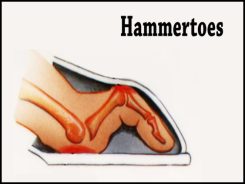 Often patients with hammertoes initially look to ease their pain with corrective surgery; however many non-surgical treatments are available. Most of the time, non-surgical procedures are required before insurance companies even consider covering surgery costs. Treatments include cortisone injections, analgesic drugs, or anti-inflammatory drugs to alleviate the pain and swelling. A few non-invasive methods include custom made inserts to help decrease discomfort or a splint to hold the hammertoe in the correct position and keep the toe from rubbing against the shoe. On occasion a splint is not useful when the toe is no longer capable of straightening. Hammertoes can be prevented by wearing correct fitting shoes and avoiding high heels.
Often patients with hammertoes initially look to ease their pain with corrective surgery; however many non-surgical treatments are available. Most of the time, non-surgical procedures are required before insurance companies even consider covering surgery costs. Treatments include cortisone injections, analgesic drugs, or anti-inflammatory drugs to alleviate the pain and swelling. A few non-invasive methods include custom made inserts to help decrease discomfort or a splint to hold the hammertoe in the correct position and keep the toe from rubbing against the shoe. On occasion a splint is not useful when the toe is no longer capable of straightening. Hammertoes can be prevented by wearing correct fitting shoes and avoiding high heels.
Successful hammertoe correction will often require the assistance of a medical professional. If you would like to make a consultation for a hammertoe, see Dr. Sharon Pletcher of Pennsylvania. Dr. Pletcher will provide you with quality treatment and attend to all of your foot and ankle needs.
Hammertoe
Hammertoe is little-known a painful condition that affects the second, third and fourth toes involving different joints of the toe and foot. Hammertoe can be caused by many other conditions such as RA (rheumatoid arthritis), osteoarthritis, trauma or injuries to your foot, it can be hereditary and it can also be caused by a cerebral vascular accident. If you wear shoes that are too narrow or short for your feet, it may exacerbate any pain you already have.
It is really important to your overall well-being to seek out medical attention at the first signs of foot pain or anything that may hinder your ability to walk in a normal manner. Taking care of your feet is one of the first steps to being able to live a full and healthy life.
If you have any questions, please feel free to contact our office located in State College, PA. We offer the newest diagnostic and treatment technologies for all your foot care needs.
Read more about hammertoes.




